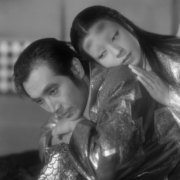A Man Vanishes: The Legacy of Shohei Imamura
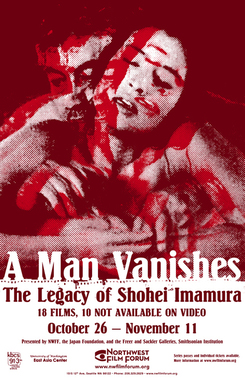
A Man Vanishes: The Legacy of Shohei Imamura
October 26 - November 12, 2007
18 FILMS, 10 NOT AVAILABLE ON VIDEO
Presented by NWFF, the Japan Foundation, and the Freer and Sackler Galleries, Smithsonian Institution.
"The Films of Shohei Imamura are among the greatest ever made."-Jonathan Demme, Director
"Not merely a great filmmaker, but one of the greatest artists in the history of cinema."-John Harkness, NOW MAGAZINE
"I like to make messy films."-Shohei Imamura
Last June, international cinema lost one of it's most cherished filmmakers, Japan's Shohei Imamura. Imamura, whose credits include the masterpiece THE BALLAD OF NARAYAMA and PIGS AND BATTLESHIPS, was a true maverick. He's the first major post-humanist to emerge in Japan, starting out just before the other great rebel of Japanese cinema, Nagisa Oshima, went into feature filmmaking. While his peers busied themselves telling classical humanist tales such as THE HUMAN CONDITION and THE BURMESE HARP, Imamura scratched and got beneath our skin. Much like his mentor Yuzo Kawashima at Nikkatsu studios, Imamura had a preference for contemporary themes, explored with frankness, humor and a lack of cant. He also had an enduring interest in the inhabitants of cultural backwaters and the lower depths, particularly earthy, strong-willed women who disdained bourgeois morality. Gradually he emerged as one of the leading figures of postwar Japanese cinema, an insightful, creative artist with a near-scientific interest in Japanese society, new and old, and a flair for depicting the human condition audaciously and entertainingly. Northwest Film Forum honors Imamura on what would have been his eightieth year with a retrospective of his work, rarely shown in the U.S.
Touring program assembled by Adam Sekuler Northwest Film Forum; Tom Vick, Freer and Sackler Galleries; and the Smithsonian Institution. We thank the following individuals and institutions for their assistance with this retrospective: Mari Hiruta, The Japan Foundation, Tokyo; Yoshihiro Nihei, The Japan Foundation, Los Angeles; Imamura Productions, Tokyo; Brian Belovarac; Janus Films.
Sponsored by KBCS Radio and University of Washington's East Asia Center.
Northwest Film Forum is pleased to offer a commemorative tour book for A MAN VANISHES: THE LEGACY OF SHOHEI IMAMURA.
This special program features essays by
Martin Scorsese, Dennis Lim, Joan Mellen and Rob Nelson
Commemorative tour books will be free on opening night!
For the remainder of the series, books are $2 while supplies last.
Available for purchase from the NWFF box office.
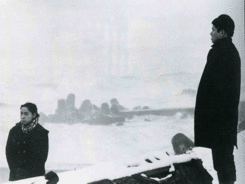
A Man Vanishes
Nov 02, 2007
Shohei Imamura, 1967, Japan, 35mm, 130 min
"An actor can become a real-life subject, and a real-life subject can become an actor"- Shohei Imamura In one of the most intricate collisions of narrative fiction and documentary, Imamura attempts to find one of the many Japanese who simply disappear in their overcrowded society. A man's fiancée searches for him, and a hidden camera records her life. She becomes enamored with a detective, who happens to be an actor in the film. A MAN VANISHES is a truly strange mixture of Imamura's fascinations with anthropology and voyeurism.

Zegen
Nov 08, 2007
Shohei Imamura, 1987, Japan, 35mm, 124 min
This satire of colonialism, starring Ken Ogata, is about a hairdresser who is sent to Manchuria to spy on the Russians, where he becomes the kingpin of a string of brothels throughout Southeast Asia. Iheiji Muraoka contributes to the government's Asian ambitions by selling women overseas. Imamura "wanted to depict Meiji nationalism going recklessly out of control"-- an ironic commentary on the hopelessly insular outlook of the Japanese national character that remains to this present day.
"Of Imamura's late films, Zegen is the most like his early masterworks: epic, energetic, sexually impudent, and grotesquely funny. A satire about colonialism, commerce, and carnality"-James Quandt, Cinematheque Ontario

Black Rain
Nov 09, 2007
Shohei Imamura, 1989, Japan, 35mm, 122 min
Adapted from a novel by Masuji Ibuse, this film follows the lives of three survivors of the US nuclear attack on Hiroshima. While the opening scenes deal with the horrible aftermath immediately following the bomb's detonation, the bulk of the film unfolds in the drama of everyday life five years later. The film follows Yasuko (Yoshiko Tanaka), her uncle Shigematsu (Kazuo Kitamura) and aunt Shigeko (Etsuko Ichihara), who are suffering from the slow death of radiation sickness. Imamura has chosen to portray the post-war discrimination against the 370,000 bomb survivors by showing its effects on the three protagonists as they struggle to live their lives traditionally. This is most evident in their repeated failures to find a husband willing to marry Yasuko, who is stigmatized for her exposure to "black rain,"a mix of radioactive ash and precipitation caused by the explosion.
"A masterwork . . . flawless . . . a profound chiller."-Vincent Canby, THE NEW YORK TIMES

The Making of a Prostitute
Nov 04, 2007
Shohei Imamura, 1968, Japan, 16mm, 70 min
"Perhaps the most brilliant and feeling of Imamura's fine documentaries"(Joan Mellen), THE MAKING OF A PROSTITUTE explores a little-known aspect of 20th-century Japanese history: the thousands of Japanese women who were sold into prostitution and sent abroad to service Japanese soldiers during the country's military expansion into Southeast Asia. Badly treated and abused, many of these women were not welcomed back by their families, and remained unrepatriated after the war. The film focuses on one particular Karayuki-san, a forgotten 73-year-old living in poverty in Malaysia. She takes Imamura on a tour of the prostitute quarter where she had arrived as a slave 54 years earlier, and reflects on the sad, often unspeakable events of her life.
"Perhaps the most brilliant and feeling of Imamura's fine documentaries."-Joan Mellen, THE WAVES AT GENJI'S DOOR
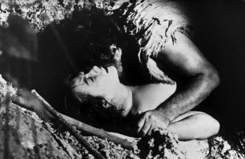
Profound Desire of the Gods
Nov 03, 2007
Shohei Imamura, 1968, Japan, 35mm, 172 min
Imamura's first color masterpiece, this epic portrait of the near-primitive and incestuous lives of the inhabitants of one of Japan's Southern Islands is Imamura's most powerful and disturbing work, and easily one of the ten greatest (and most unforgettable) films of all time.
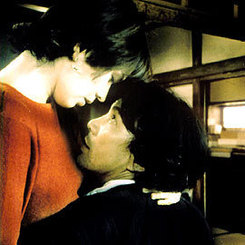
Warm Water Under a Red Bridge
Nov 12, 2007
Shohei Imamura, 2001, Japan, 35mm, 120 min
A combination of Keaton-esque whimsy, improvised mythology and Imamura's own facility with the underbelly of life, WARM WATER is a quirky, charming film about rebirth, renewal and a raucous cheering for the power of the feminine. Starring Koji Yakusho, star of THE EEL, Imamura's twentieth film is about a middle-aged man whose wife has left him. He then travels to a far-off village in search of a golden Buddha. What he finds instead is a woman with a strange case of kleptomania and a propensity for expressing pleasure with a shower of – well -- on the big screen it comes across like fireworks.
May well be Imamura's funniest film; it is also one of his most accomplished…A complex and risky work carried off with an effortlessness that comes only from wisdom and experience."-Kevin Thomas, LOS ANGELES
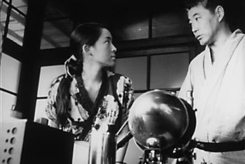
Dr. Akagi
Nov 11, 2007
Shohei Imamura, 1998, Japan, 35mm, 129 min
DR. AKAGI is an eccentric black comedy and a humanistic portrait of pre-Hiroshima Japan that bubbles over with doses of savage wit, kinky sexuality and apocalyptic uncertainty. Set on a small Japanese island in the waning days of World War II, the film tells the story of one man's obsession to retain his decency and stamp out deadly disease. Akagi is an eccentric iconoclast whose determination to cure a hepatitis epidemic has earned him the nickname "Dr. Liver."From the fringes of Japan's militaristic society, Akagi gathers a motley crew of helpers: a dissolute monk, a nihilistic morphine-addict surgeon, a young ex-prostitute, and a wounded Dutch soldier. Together they round up a fresh corpse, a powerful microscope and movie lamp to assist Akagi in his determined and quixotic effort to locate the disease causing microbes.
"Brilliant! Brimming with humanity and humor tied to a darker, violent... sexually kinky undercurrent."-Thelma Adams, THE NEW YORK POST
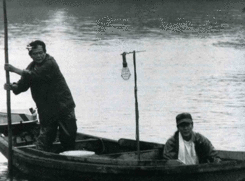
The Eel
Nov 10, 2007
Shohei Imamura, 1997, Japan, 35mm, 117 min
A man, acting on an anonymous tip, finds his wife in bed with another man. In a fit of rage he stabs her to death. Eight years later, after being released from prison, he moves to a small, lakeside town and opens a barbershop. In the corner of the shop is an aquarium housing his companion from his prison stay, his pet eel - the only living thing he will talk to. Eventually, the town's eccentric characters accept the man and happily make his barbershop their meeting place, while he, desperate to forget his past, guards against any attraction he may feel for women. One day he happens upon a young woman unconscious after a suicide attempt. Once recovered, she comes to work for him in the shop. She would like to know him more intimately, but he remains reluctant. He soon learns, however, that she has a past every bit as painful as his own.
"[Imamura] marshals a small cast of vivid characters that enable him not only to bare the passions that seethe beneath the orderly surface and apparent conformity of Japanese life, but also to ponder emotions and issues that know no nationality."–THE NEW YORK TIMES
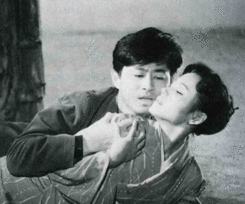
Stolen Desire
Oct 26, 2007
Shohei Imamura, Japan, 1958, 35mm, 92 min
STOLEN DESIRE is a pitch-perfect film noir about a gang of thieves who return to a formerly bombed out neighborhood to retrieve their buried stash of illegal morphine. But a pharmacy has been built on the burial site and they wind up renting the house across the street and tunneling into the pharmacy basement to steal back their money. STOLEN DESIRE is very dark but very funny.
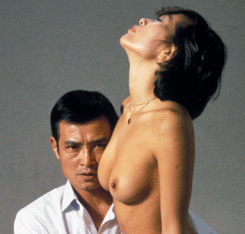
Vengeance is Mine
Nov 02 - Nov 08, 2007
Shohei Imamura, 1979, Japan, 35mm, 140 min
Based on the true story of Iwao Enokizu and his murderous rampage which sparked a 78-day nationwide manhunt, Shohei Imamura's disturbing gem VENGEANCE IS MINE won every major award in Japan in 1979. Imamura uncovers the seedy underbelly of civilized Japanese society. Iwao, a day-laborer and smalltime con-artist, embarks on a psychopathic spree of rape and murder after killing two of his co-workers. Eluding the police and public, Japan's infamous "King of Criminals"passes himself off as a Kyoto University professor, only to become entangled with an innkeeper and her perverted mother. More than just a true-crime case, VENGEANCE IS MINE bares mankind's snarling id.
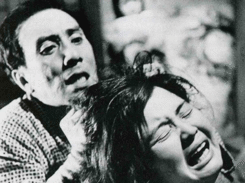
Intentions of Murder
Oct 31, 2007
Shohei Imamura, 1964, Japan, 35mm, 150 min
A large housewife, Sadako is married to a boring, weak willed tyrant, who treats her like a servant. When he is out of town, a burglar rapes the heroine. Instead of following the traditional Japanese code and committing suicide, she is made more assertive by the violent act. When the rapist returns, she first consents, and then plans to kill him. INTENTIONS OF A MURDER is an amazing, moralistic tale exploring the place of women in Japanese society.
"A strange and fascinating film . . . an authentic shocker."-THE NEW YORK TIMES
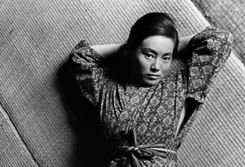
Insect Women
Oct 30, 2007
Shohei Imamura, 1963, Japan, 35mm, 123 min
Tome, a uneducated farming woman, leaves near-poverty and small town incest for Tokyo. She soon becomes first a factory worker and then a prostitute. After WWII, she attempts to work her way into the position of a madam, but is unsuccessful. While she commits many acts that are traditionally considered immoral, Imamura is more concerned with portraying the woman, played by a 40-year-old prostitute, as a survivor.

Pigs and Battleships
Oct 29, 2007
Shohei Imamura, 1961, Japan, 35mm, 108 min
The story of a young gang living outside of the U. S. naval base at Yokosuka, PIGS AND BATTLESHIPS follows their failed attempts to raise pigs on the trash thrown out by the military. The film descends into hilarious scenes of the small time gangster's plans being thwarted, and the resulting infighting. Ultimately a political satire, the film is not so much critical of the American occupiers as the Japanese who grow wealthy off their presence in Asia.
"An expansive, loopy film of extravagant set pieces and distinctive dark humor."-J. Hoberman, THE VILLAGE VOICE
Cast member Cliff Harington to introduce the 7pm screening

My Second Brother
Oct 28, 2007
Shohei Imamura, 1958, Japan, 35mm, 92 min
Based on a best-selling diary of a ten-year-old girl this film follows the travails of four brothers and sisters and the people around them in a poor mining town with both a fresh and energetic eye. Winner of the Japanese Minister of Education Award.
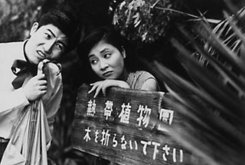
Nishi Ginza Station
Oct 27, 2007
Shohei Imamura, 1958, Japan, 35mm, 52 min
NISHI GINZA STATION will remind audiences of Jacques Demy and Frank Tashlin. The control of the Nikkatsu studio over the project was total; they commissioned a showcase film for hot singer Frank Nagai. Imamura pleaded tone deafness, but the studio retorted that he could make whatever film he wanted as long as the popular title song was repeated three times. A drugstore owner is seized by tropical island daydreams so vivid that he loses control of himself in public. His wife, fearing that he'll be unfaithful to her, asks another woman to look after him while she's away. The new couple wind up on a small boat in a storm, and soon think they've been blown all the way to his tropical isle. A wry comment on how thoroughly civilization has tamed our most libidinous fantasies, NISHI GINZA STATION is "the unexpected discovery" of the Imamura retrospective!
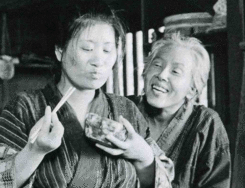
The Ballad of Narayama
Nov 07, 2007
Shohei Imamura, 1983, Japan, 35mm, 130 min
THE BALLAD OF NARAYAMA is a brutal and haunting, yet ultimately poignant meditation on the nature of existence. Shichiro Fukazawa's novel about the legend of people over the age of 70, taken to the mountains on their children's shoulders and left there to die, has always fascinated Imamura, who said that he wanted to shoot an entire film version on location when he was still an assistant director. Winner of the Palme d'Or at Cannes.
"A truly great film . . . A masterpiece of Japanese cinema to stand beside UGETSU, TOKYO STORY or THE SEVEN SAMURAI."-Michael Wilmington
"Imamura realizes this vision with shocking humor and immediacy, and then challenges us to say whether this fictitious community is more or less humane than ours. Awe-inspiring."-TIME OUT LONDON

